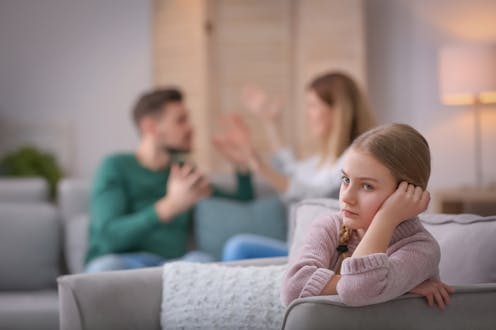Should my child have a COVID vaccine? Here's what can happen when parents disagree
- Written by Nicholas Wood, Associate Professor, Discipline of Childhood and Adolescent Health, University of Sydney

Australian children aged 5-11 are eligible to receive their COVID-19 vaccine from today.
For many parents, vaccinating their child is a shared decision with both parents agreeing to go ahead.
But not all parents agree.
As we roll out COVID vaccines to younger children this week, what options are there if one parent wants to vaccinate their child but the other doesn’t?
Why do parents disagree about COVID vaccines?
Before COVID, parents chose to vaccinate their children for a range of reasons. This included a feeling of social responsibility, a belief in the protective medical benefit and safety of vaccines, and possibly a financial incentive, driven by policies including “No Jab No Pay”.
However, for some, barriers to timely vaccination remain. For instance, childhood illnesses may have prevented vaccination, or it may be difficult to get to a vaccine clinic because of work commitments or lack of transport.
Read more: Why do people not vaccinate?
Others believe vaccination has unacceptable side effects or immunisation is ineffective in preventing disease. Others believe vaccines contain harmful substances, prefer natural or homeopathic alternatives, or mistrust medical evidence supporting the safety and efficacy of vaccination.
A minority of parents also falsely believe these apply to COVID-19 vaccines.
Why are disputes more of an issue now?
As we roll out COVID-19 vaccines to more children, vaccine disputes between parents may rise.
If parents disagree, what happens next partly depends on the age and maturity of the child.
For instance, teenagers aged 16 years and older are usually considered to have the capacity to consent for themselves. So if parents disagree, older teenagers with the capacity to consent can go ahead and get their shot anyway.
Where disputes are likely to arise is for younger children. For those aged 12-15, vaccinators like to see agreement from the adolescent to be vaccinated plus consent from the parent or guardian.
For children under 12, a parent or guardian needs to provide consent as young children are not deemed to have capacity to do so.
Written consent to vaccination is not required in Australia.
What happens next?
When parents disagree over whether to vaccinate their child, the child may be delayed in getting vaccinated or can remain unvaccinated until they can consent themselves.
Depending on the relationship between parents and whether it is safe to do so, parents can look together at reliable sources of information and answers to frequently asked questions about vaccination. These may address any misunderstandings or disagreements.
Seeking external advice from a neutral third party, such as a GP or specialist immunisation service, is also recommended. Other options include getting in touch with community organisations, such as family relationships organisations, or the Family Relationship Advice Line (1800 050 321). These may be able to advise about mediation.
If these methods fail, going to court may be the last resort. This comes with significant financial and emotional costs, so is best avoided.
Australia’s Family Court has set up a COVID-19 list to prepare for hearing disputes about children being vaccinated against COVID-19. The courts have already seen a rise in applications.
We can’t say for certain how the courts will decide. What we do know, however, is what happened when non COVID-19 vaccination disputes went to court.
The court has favoured vaccination
In research we have submitted for publication, we reviewed 27 cases involving parental disputes involving non COVID-19 immunisations. These went to court in Australia between 2002 and 2021.
In 21 of those cases, the court decided in favour of the parent who supported vaccination. In five cases, the court declined to make a decision due to a lack of medical expert evidence presented and asked this be gathered for future hearings. In only one case was parental responsibility awarded to the party opposing vaccination.
In all cases where traditional Western medical expert evidence was presented, the court decided in favour of the parent who supported vaccination.
Read more: Safety, side effects, allergies and doses. The COVID-19 Pfizer vaccine for 5-11 year olds explained
In many cases, courts made statements on the individual and public benefits of immunisation. Common themes across judgements included:
- any potential risks of vaccination are greatly outweighed by the risk of harm from vaccine-preventable diseases
- failure of a parent to immunise exposes a child to risk of harm
- indirect benefits of immunisation to the community argues in favour of vaccination.
Many of these statements made about non COVID-19 vaccines also apply to COVID-19 vaccines.
Based on prior experience it seems likely courts will decide in favour of immunisation.
Start the discussion now
Almost 80% of Australian 12 to 15 year olds have had one dose of COVID vaccine and about 73% have had two doses. So if vaccine uptake in this age group is an accurate guide of parents’ views, we are likely to see similar high uptake in children aged 5-11.
Over 7 million children aged 5-11 in the US have received the first dose of COVID-19 vaccine and over 4 million have had two doses.
Clinical trial data of children this age showed they made antibodies and the vaccine showed efficacy. Real-world data is anticipated. There have been no safety concerns to date.
So, if you haven’t already started talking about vaccinating your child, now is the time.
Grace Barbara, a 4th year medical student at the University of Sydney, conducted the review of legal cases and contributed to research mentioned in this article.
Authors: Nicholas Wood, Associate Professor, Discipline of Childhood and Adolescent Health, University of Sydney





